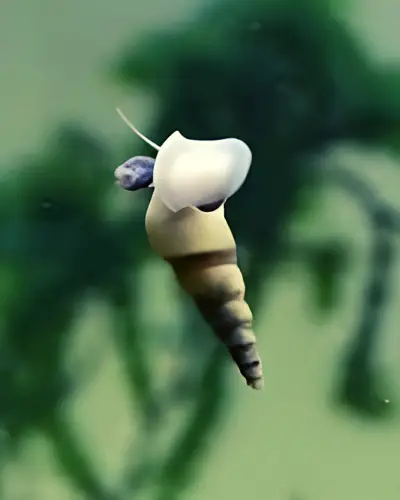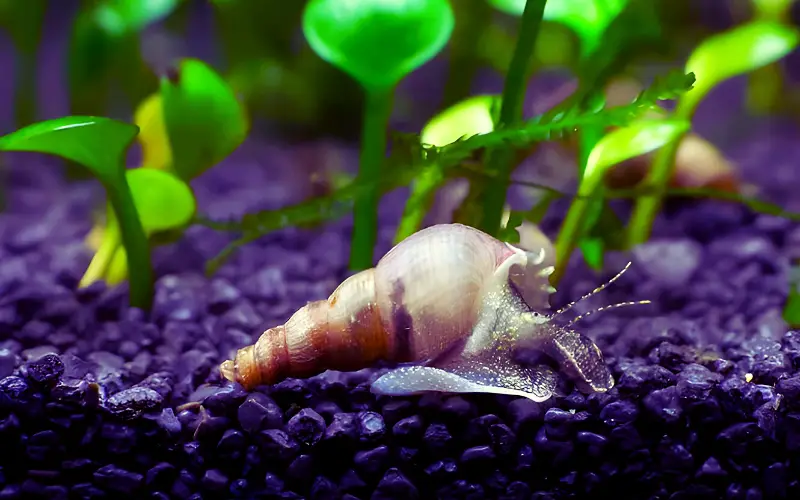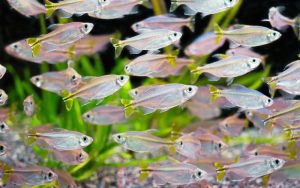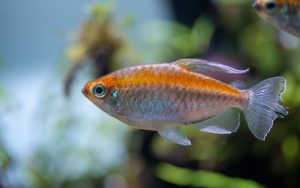What is the Maximum Malaysian trumpet snail lifespan? They’re the silent workforce of your freshwater aquarium, diligently cleaning algae and turning the substrate.
While they might not be the flashiest residents, these little gastropods play a crucial role in maintaining a healthy ecosystem. But have you ever considered their life cycle?
The Malaysian trumpet snail’s lifespan is shrouded in mystery, with varying information and anecdotal experiences. Do these shelled janitors live for a fleeting few months or several years?

The answer, as with most things in nature, is that it depends. Join us as we explore the fascinating factors that influence the longevity of these underwater marvels.
We’ll delve into their preferred environments, dietary needs, and potential threats, ultimately shedding light on the question of just how long we can expect our Malaysian Trumpet Snails to grace our aquariums.
Table of Contents
ToggleAverage Malaysian Trumpet Snail Lifespan in Aquariums
How long do Malaysian trumpet snails live for? The average lifespan of a Malaysian Trumpet Snail in an aquarium is around one year. However, there are a few things to consider that can affect the lifespan Malaysian trumpet snail:
- Water Quality: Just like any other aquarium inhabitant, Malaysian Trumpet Snails thrive in clean, well-maintained tanks. Good water quality can help them live longer.
- Food Source: These snails are scavengers and eat algae, detritus, and leftover fish food. A steady supply of food will contribute to their health and extend their life span.
- Tank Conditions: Stable water temperature and parameters are essential for snail health. Some sources suggest a life span of up to 5 years in ideal conditions.
Overall, while one year is a reasonable estimate, with proper care, your Malaysian Trumpet Snails could live for a few years longer.
Malaysian trumpet snails are among aquarists’ most popular aquarium snail species. They are easy to care for and can survive in a wide range of water parameters.
These aquatic snails can thrive and reproduce quickly in a well-maintained aquarium with a variety of food sources like detritus and pellets. Despite their small size, Malaysian trumpet snails for sale are excellent cleaners and scavengers, helping to balance the tank’s ecosystem.
Malaysian trumpet snails reproduce rapidly, so hobbyists need to monitor their snail populations and perform regular water changes to maintain water quality.
Where To Find Malaysian Trumpet Snails?
So, are you interested in adding some Malaysian Trumpet Snails to your aquarium cleanup crew? Fantastic choice!

These little workers are not only efficient algae eaters but also fascinating to observe. But where exactly can you find them?
Here are a few avenues to find these Underwater Gems :
- Local Fish Stores: Your neighborhood aquarium store is a great starting point. Many carry Malaysian Trumpet Snails, often at affordable prices. You can also inquire about their specific care requirements and compatibility with your existing tank inhabitants.
- Online Retailers: A vast selection of aquatic life awaits in the online marketplace. Numerous reputable retailers specialize in snails and other invertebrates. This option offers convenience and the ability to compare prices and varieties.
- Fellow Aquarium Hobbyists: Connect with other aquarium enthusiasts through online forums, social media groups, or local clubs. Often, hobbyists have extra snails they’re willing to share or sell. This can be a great way to acquire snails while also gaining valuable insights and advice from experienced keepers.
- Hitchhikers: Sometimes, Malaysian Trumpet Snails arrive as stowaways on plants or decorations purchased from other tanks. While this can be a pleasant surprise, be cautious, as hitchhikers might also introduce unwanted pests or diseases. Quarantine new additions before introducing them to your main tank.
Remember, regardless of where you find your Malaysian Trumpet Snails, ensure they come from a healthy and reputable source. Observe them for any signs of illness or unusual behavior before adding them to your established aquarium community.
Distribution of the Malaysian Trumpet Snails
The Malaysian Trumpet Snails are freshwater snails that can grow up to an inch in length. These nocturnal creatures are often found at the bottom of the tank, feeding on decaying plants, leftover food, and organic matter.
They have a conical shell with a whorl and a pair of tentacles on their heads. These snails can also help keep the substrate clean by eating algae wafers and other waste. In the right conditions, Malaysian Trumpet Snails can reproduce quickly, so it’s essential to keep an eye on their population in your tank, especially if you have live plants.
One of the best things about MTS Snails is that they can improve water conditions in your aquarium. They help break down ammonia and other waste, keeping the tank clean and healthy for your fish, ghost shrimp, crayfish, and other tank inhabitants.
These snails thrive in suboptimal water conditions, making them a great addition to a home aquarium. They can also grow in rings, indicating their age and growth patterns. If you notice your snails motionless for extended periods, they are likely resting or bracing themselves for possible changes in water conditions.
6 Benefits of keeping Malaysian Trumpet Snails (Melanoides tuberculata)
While often overlooked, Malaysian Trumpet Snails play a vital role in maintaining a healthy and balanced freshwater aquarium. These tiny but mighty mollusks offer a surprising array of benefits:
- Algae Control: Their primary claim to fame is their insatiable appetite for algae. They diligently graze on algae growing on glass, decorations, and plants, keeping your tank sparkling clean and preventing gas and unsightly algae blooms.
- Substrate Aeration: As they burrow through the substrate, they help prevent anaerobic pockets and compaction, ensuring proper oxygenation and beneficial bacteria growth within the substrate.
- Waste Management: Malaysian Trumpet Snails are scavengers, consuming leftover fish food, decaying plant matter, and other organic debris. This helps maintain water quality and reduces the risk of ammonia spikes.
- Live Food Source: Some fish species, particularly loaches and pufferfish, relish snails as a natural part of their diet. Malaysian Trumpet Snails can serve as a sustainable and readily available food source.
- Fascinating Behavior: Observing their burrowing, grazing, and even breeding behaviors can be quite entertaining. Their presence adds a dynamic element to the aquarium ecosystem.
- Low Maintenance: These snails are incredibly easy to care for, requiring minimal intervention. They thrive in a variety of water conditions and readily reproduce, ensuring a self-sustaining population.
A word of caution: While generally beneficial, their prolific breeding can lead to overpopulation in some cases. Monitor their numbers and consider population control methods if necessary.
Malaysian Trumpet Snail Caring Tips to Maximize Their Longevity
Here are some Malaysian Trumpet Snail caring tips to maximize their lifespan:
Water Quality:
- Regular Water Changes: Perform consistent partial water changes to keep ammonia and nitrite levels at 0 ppm and control nitrates. This mimics their natural environment and reduces stress.
- Stable Parameters: Aim for a pH of 7.0 to 7.5 and slightly hard water. Avoid drastic temperature fluctuations, keeping it between 70 and 78 Degrees Fahrenheit.
- Filtration: While they benefit from filtration, avoid strong currents that can suck them in.
Diet:
- Variety is Key: Since they are scavengers, they offer a mix of leftover fish food, algae wafers, blanched vegetables (spinach, broccoli, cucumber), and sinking pellets.
- Calcium Supplement: Provide a calcium source like crushed cuttlebone to aid shell growth.
Tank Environment:
- Substrate: A soft substrate like sand or fine gravel allows them to burrow for hiding and digging, which helps with gas exchange in the tank.
- Peaceful Tank Mates: House them with peaceful fish that won’t prey on them. Avoid aggressive tank mates like puffers or loaches.
- Copper-Free Treatments: Copper is toxic to snails. Be cautious with medications and fertilizers, opting for copper-free alternatives.
Additional Tips:
- Prevent Overfeeding: Overfeeding can lead to excess waste and ammonia spikes, harming the snails.
- Predatory Control: If your population seems to be dwindling due to predators, consider removing the culprit or providing ample hiding places for the snails.
By following these tips, you can create a healthy environment that will help your Malaysian Trumpet Snails thrive and reach their entire life of several years.
The Shell Game: Calcium and Malaysian Trumpet Snails
For Malaysian Trumpet Snails, their shells are more than just a home; they’re a vital part of their physiology and protection. The key building block of these shells is calcium. Understanding the role of calcium and ensuring its availability is crucial for the health and well-being of your snails.
– The Importance of Calcium:
- Shell Growth and Maintenance: Calcium carbonate forms the main component of their shells. As snails grow, they require a consistent supply of calcium to build and maintain strong, healthy shells. Without adequate calcium, their shells can become thin, brittle, and prone to damage.
- Metabolic Functions: Calcium also plays a role in various metabolic processes, including muscle function, nerve transmission, and enzyme activity.
– Ensuring Adequate Calcium:
- Water Hardness: Hard water naturally contains dissolved calcium and minerals, providing a readily available source for snails. If your water is soft, consider adding calcium supplements specifically designed for aquariums.
- Cuttlebone: Placing a cuttlebone in the tank is a popular and effective method. Snails will rasp on the cuttlebone, extracting the calcium they need.
- Calcium-Rich Foods: Supplementing their diet with calcium-rich foods can also be beneficial. Blanched vegetables like kale or spinach, along with commercially available snail food with added calcium, can help meet their needs.
– Signs of Calcium Deficiency:
- Thin or Pitted Shells: Shells that appear thin, brittle, or have pits or holes are a clear indicator of calcium deficiency.
- Slow Growth: Snails with insufficient calcium may experience stunted growth.
By providing a calcium-rich environment and a balanced diet, you can ensure your Malaysian Trumpet Snails have the resources they need to build strong shells and thrive in your aquarium.
Suitable Malaysian Trumpet Snails Tank Mates
Suitable tank mates for the Malaysian Trumpet Snail include small snails, such as the red-rimmed Melania and amano shrimp. These aquatic creatures can easily coexist in a 10-gallon tank.
It is important to avoid purchasing larger fish that may prey on the smaller snails. Malaysian Trumpet Snails are known for their ability to get sucked into sponge filters, so it is crucial to keep an eye on them when the lights go out. These undemanding snails will happily feed on fish flakes, soft algae, and plant fertilizers in their subtropical habitat.
Juvenile snails spend hours buried in the canal, feeding on their natural diet until they emerge as smaller snails. In optimal conditions, the snail’s operculum will be visible as they move through the tank, keeping it clean and healthy. Malaysian Trumpet Snails reproduce by clones without the need for a mate, making them a great addition to any aquarium.
Commonly Asked Questions about Malaysian Trumpet Snails Lifespan (FAQs)
How long do Malaysian trumpet snails live for?
Malaysian trumpet snails typically live around one year. With good water conditions and a little luck, they can surpass that life!
Does anything eat Malaysian trumpet snails?
Yes, several fish enjoy eating Malaysian trumpet snails. Popular options include clown loaches, yoyo loaches, and dwarf chain loaches. These loaches have a technique for pulling the snail out of its shell for a tasty meal.
Are Malaysian trumpet snails hardy?
Yes, Malaysian trumpet snails are very hardy aquarium snails. They can tolerate a wide range of water conditions and are known for being excellent scavengers, helping keep your tank clean.
Can Malaysian trumpet snails survive winter?
Yes, Malaysian trumpet snails are tough! They can survive winter temperatures even approaching freezing, though breeding likely slows or stops.
Will Malaysian trumpet snails burrow in gravel?
Yes, Malaysian trumpet snails burrow in the gravel! They use their long snouts to sift through it to find food and help keep the substrate aerated. However, very tightly packed gravel might be difficult for them to burrow deeply in.
What kills Malaysian trumpet snails?
Several methods can control Malaysian trumpet snails in aquariums. Manual removal, predator fish, and traps are natural solutions. Copper-based medications or medications with flubendazole are chemical options. Be cautious when using chemicals; research safety for your fish and ecosystem.
Final Thoughts
From their algae-eating prowess to their fascinating burrowing behaviors, Malaysian Trumpet Snails offer a unique and valuable presence in freshwater aquariums. Understanding their needs, from calcium-rich environments to compatible tank mates, allows us to appreciate their role in maintaining a balanced ecosystem. Their quiet diligence and intriguing life cycle remind us of the interconnectedness of life within our miniature aquatic worlds.
So, the next time you spot a Malaysian Trumpet Snail gliding across your tank glass or diligently sifting through the substrate, take a moment to marvel at this tiny but mighty creature. And remember, while the Malaysian trumpet snail’s lifespan may seem relatively short, its impact on our aquariums and our appreciation for the diversity of life is truly enduring.
You might also like
- Clea Anentome Helena Snails 101: (A Comprehensive Guide)
- How Big Do Malaysian Trumpet Snails Get: (Expert Guide)
- Malaysian Trumpet Snail Infestation: (4 Secrets to Control!)
- Breeding Malaysian Trumpet Snails: Complete Beginner’s Guide
- Can Malaysian Trumpet Snails Live Out of Water: (Answered)
- Malaysian Trumpet Snail Size: 5 HUGE facts you NEED to know




